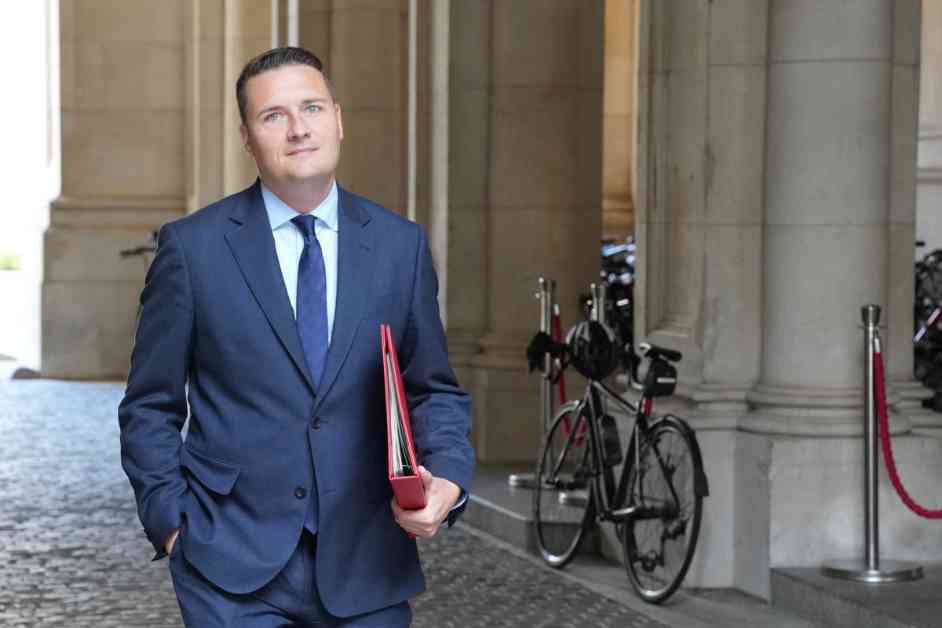**Junior Doctors Overwhelmingly Approve Government Pay Deal**
Junior doctors in the UK have voted to accept a Government pay deal that will see their salaries increase by an average of 22.3% over the course of two years. The British Medical Association announced that the deal, which will result in pay rises ranging from 3.71% to 5.05%, with an average increase of 4.05%, will be backdated to April 2023.
**Positive Response from Health Secretary Wes Streeting**
Health Secretary Wes Streeting expressed his satisfaction with the BMA’s acceptance of the pay deal, stating that the situation “should never have been allowed to get this bad.” Streeting emphasized the importance of resolving the dispute and reaching an agreement to avoid further disruptions in the healthcare system.
In a statement, the BMA confirmed that 66% of junior doctors voted in favor of the deal, demonstrating strong support from the medical community. Additionally, the government has agreed to rename junior doctors as “resident doctors” beginning in September 2023 to better reflect their expertise and roles within the healthcare system.
**Significant Pay Increases for Junior Doctors**
The pay deal will result in substantial salary increases for junior doctors across different stages of their careers. A doctor starting foundation training in the NHS will see their base pay rise to £36,600, up from approximately £32,400. Similarly, a full-time doctor entering specialty training will experience a basic pay increase to £49,900 from around £43,900, providing financial relief and recognition for their dedication to patient care.
The online referendum conducted among junior doctors in England saw a high turnout of 69%, with 45,830 doctors participating in the voting process between August 19 and September 15. The overwhelming support for the pay deal indicates a strong desire for fair compensation and improved working conditions among healthcare professionals.
**Efforts to Improve NHS Working Conditions**
Health Secretary Wes Streeting acknowledged the challenges faced by the NHS, including previous strikes and negotiations that had stalled. He emphasized the government’s commitment to ending the strikes and prioritizing healthcare reforms to address waiting lists and improve the overall efficiency of the health service.
Amanda Pritchard, chief executive of NHS England, welcomed the acceptance of the pay deal by junior doctors, emphasizing the significance of providing certainty and stability within the healthcare system. Pritchard highlighted the essential role of junior doctors in delivering quality care to patients and reiterated the importance of valuing and supporting their contributions to the NHS.
**Long-term Commitment to Pay Restoration**
The BMA junior doctors committee co-chairs, Dr. Robert Laurenson and Dr. Vivek Trivedi, expressed their satisfaction with the pay deal, noting that it marks the end of 15 years of pay erosion and the beginning of two years of modest above-inflation pay rises. They emphasized the importance of continued collaboration between the government, the BMA, and healthcare professionals to implement the actions outlined in the agreement.
Despite the progress achieved with the pay deal, Dr. Laurenson and Dr. Trivedi acknowledged that there is still work to be done to address the pay gap and ensure fair compensation for doctors. They emphasized the need for ongoing efforts to improve working conditions and support the well-being of healthcare professionals in the NHS.
**Conclusion**
Overall, the acceptance of the Government pay deal by junior doctors in the UK represents a significant milestone in addressing longstanding issues related to pay and working conditions within the healthcare system. The agreement demonstrates a collaborative effort between the government, the BMA, and healthcare professionals to prioritize the well-being of doctors and improve patient care in the NHS. Moving forward, continued dialogue and cooperation will be essential to sustain the positive momentum generated by the pay deal and drive further improvements in the healthcare sector.












